Returning to Cambodia
Now I remember one of the things that drove me out of Cambodia. The constant exposure to suffering by thinking human beings existing in inhuman circumstances, combined with the constant awareness that one could mitigate that suffering, if only temporarily, and only for a small number. If you can normally disregard your own humanity, here it gnaws away at you. What is that ember? You look inside, and you see a heap of ashes where you thought your heart was.
At the end of February 1998, after six months of traveling around the world, I returned to Cambodia to swelter in listless unemployment for two months--and then stumble into a job as press secretary for the Cambodian democratic opposition.
Here you'll find notes and writings on
No Dancing
April 21, 1998
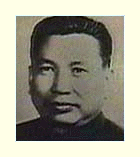 There was no dancing in the streets of Phnom Penh when the news of Pol Pot's death drifted down from the mountains, borne on radio waves and telephone wires. At first there was skepticism. He had been reported dead a couple of years earlier, only to reappear as the hidden leader of the Khmer Rouge and later as their captive. But this time it was true: One of the great monsters of history died last Wednesday, on the evening of the second day of the Khmer new year celebration.
There was no dancing in the streets of Phnom Penh when the news of Pol Pot's death drifted down from the mountains, borne on radio waves and telephone wires. At first there was skepticism. He had been reported dead a couple of years earlier, only to reappear as the hidden leader of the Khmer Rouge and later as their captive. But this time it was true: One of the great monsters of history died last Wednesday, on the evening of the second day of the Khmer new year celebration.
Like some of you, I saw the news on CNN, which the staff at the gym are kind enough to switch to when I arrive. They watched with some interest, but as I left they changed the channel back to karaoke videos of Khmer love songs.
Later that day the skies darkened and poured out the first rain in months. Huge drops drenched the streets and rinsed a season's dust off the leaves of the plants on my balcony. The water ran off the roof and filled the rotting gutters, which leaked anyway, and splattered the muddy result onto my motorbike parked in front of the art shop downstairs. Across the street it carved rivulets and canyons into the mountains of sand which were mysteriously dumped on the sidewalk last month and seem to serve only as a playground for a small army of toddlers, who run up and down them in between bathroom breaks, which they take in the gutter.
I asked Mon, who cleans the apartment, if she was happy about Pol Pot.
"What about Pol Pot?" she asked in Khmer.
"Pol Pot is dead," I replied. "Last night his heart stopped."
She flashed a quick confused smile and went back to ironing. Mon is about 40, so she would have been a teenager when the Khmer Rouge completed their takeover of Cambodia. At best, she probably suffered four years of extreme deprivation and punishingly hard labor. When she passes by me during the course of her work, she pauses meekly and then crouches down low and creeps by. I have never asked her about her experience for fear she might panic, or fall apart in some unimagined way, a way I don't have the strength to see.
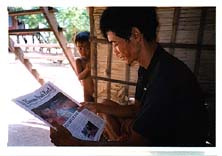 The Cambodian television stations didn't mention Pol Pot's death for two days. By Friday only one Khmer newspaper had reported it.
The Cambodian television stations didn't mention Pol Pot's death for two days. By Friday only one Khmer newspaper had reported it.
Meanwhile, the Bangkok Post filled its front page with a color photo of the corpse. Pointing at the huge photo, I asked the guys at the bank if they believed it.
"No," said one, "It's a trick. It's not him."
His friend disagreed, sort of.
"Well, it could be him. But they could have found someone else who looked like him." I pointed out that we all saw the videotape of Pol Pot at his "trial" only last year, and this was surely the same man, despite an inadequate black dye job on his silver hair.
"They could have replaced him before, and the real Pol Pot is still out there." The black dye seemed to raise suspicion, even if it was hard to see how it made the case for Pol Pot's death less convincing.
I went home and asked one of the art shop guys in my landlady's family if he was happy about Pol Pot.
"What about Pol Pot?" he asked in English. I told him, but he did not go out to dance in the street. He just said, "Oh, I didn't hear about that", and went back to putting on his black pants and white shirt. He works nights as a blackjack dealer at the floating casino. He's just about 25, so he probably remembers little or nothing of the Khmer Rouge regime.
Slowly, slowly, the news went around the city. It seems to be taking about the same amount of time to sink in as, in 1975, it had taken the Khmer Rouge to force the city's swollen population out to the rice fields.
On Saturday I went to the gym again. In six visits so far I have not seen another customer. I pedaled away on the bicycle and watched a thin black plume rise from Pol Pot's funeral pyre. A crowd of journalists were shown, pressing against a fence, trying hard to get a better look. For the most part they were photographers and cameramen from the Thai side of the border, which is an easy drive on smooth Thai roads from Bangkok.
Most of the Phnom Penh press corps was either stuck uselessly in Siem Reap, shadowing the King, or stuck at the bar of the Foreign Correspondents Club in the capital, pouring back coffee and beer, and trading war stories and comparing theories on about the degree to which the death of Pol Pot was a natural occurrence. (Click here to read mine.)
Though the Khmer Rouge presiding over the corpse's disposition did all they could to dispel any doubt it was Pol Pot's, they were less careful to preserve evidence that might have helped prove they didn't kill him. No blood samples were kept, for example. The Cambodian people have never gotten any answers before, and they probably won't get any this time either.
Now it's Monday, and the week of the New Year holiday is over. If you watch CNN or listen to BBC, you probably hear as much about Pol Pot as you would if you lived here.
See links to sites about the Khmer Rouge regime on my Cambodia links page.
The Cambodian Campaign Trail
May-July, 1998
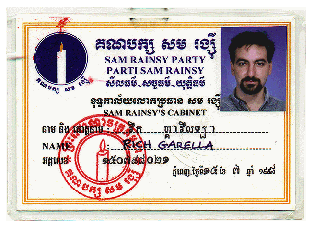 Note: What you're reading here is mine alone. If you need to reach the Sam Rainsy Party, e-mail the Cabinet at samrainsy@bigpond.com.kh or see the SRP-USA website. I am no longer in Cambodia or working for or representing the SRP.
Note: What you're reading here is mine alone. If you need to reach the Sam Rainsy Party, e-mail the Cabinet at samrainsy@bigpond.com.kh or see the SRP-USA website. I am no longer in Cambodia or working for or representing the SRP.
Saturday May 16, 1998: With a jolt the blades of the outboard motor bit once again into the roiling, rain-puckered surface of the Mekong. The motor whined and pushed our bathtub-sized boat forward again, into the blackness north of Kompong Cham.
I hunched forward, trying vainly to protect my backpack and its contents from the fat drops of rain that smacked me like birds' eggs. In the seat ahead of me was Eric, a reporter for the Phnom Penh Post and a former colleague at The Cambodia Daily, doing the same. Behind me the pilot of the speedboat stood, peering through the visor of a motorcycle helmet into the darkness ahead. From time to time he veered to avoid a fishing boat, net or piling that suddenly flashed into view, illuminated by the bolts of lightning striking one riverbank and then the other. Set among the few villages on the left bank were logging depots run by semi-independent military warlords allied with the province's governor, the brother of Hun Sen. Along the right bank was the road to Chhlong, reputed to be seething with bandits.
The bolts were so close they left a glow of heat on our faces. Sometimes another passenger shone a tiny flashlight ahead, in the vain hope it could prevent the boat from running aground again, but the feeble beam only illuminated millions of raindrops.
"Hey Rich--" screamed Eric over the rhythmically undulating whine of the straining engine, "--did you ever feel so mortal--"
My first day at my new job was only a few hours from over. Yesterday I was hired to do English-language communications for Sam Rainsy, Cambodia's main opposition politician. I'm the only foreigner there, and the only paid staffer. A short introduction is in order, because otherwise a lot of this won't make sense. A lot might not anyway, but I'll give it a shot.
Rainsy used to be Finance Minister in the early days of the coalition government that took over Cambodia after the UN-organized elections in 1993. Rainsy's party, Funcinpec, won the election. But Hun Sen's party, the Cambodian People's Party, threatened to fight unless it was allowed into a coalition.
Together the two parties formed an efficient kleptocracy, siphoning off billions from the Cambodian economy while the UN and other international organizations poured billions into the other end. To keep it simple: Rainsy wouldn't play along. He demanded the public release of the government's logging contracts, and the CPP got Funcinpec to give him the shove. He was stripped of both his seat in the National Assembly and his post as Finance Minister, and took on a full-time role as the government's most vocal critic. He formed an opposition party, the Khmer Nation Party (now the Sam Rainsy Party), which attracted a core of young urban strivers, students, and factory workers, and won the hearts of many Cambodians all across the country.
The pitch of the motor dropped, and the boat started to drag. Slower and slower, until it stopped. One pilot stepped out. The water was ankle-deep. He unzipped and took a leak. The other pilot bent over with a lighter and clicked it over and over, trying to spark up a crumpled cigarette. In the flash of the lighter I could see he was bending over two plastic milk jugs. One them had a tube running out its open mouth to the motor. The pilot pulled it out and stuck it into the other jug. So in addition to crashing, drowning, lightning and bandits, I thought, we get to travel on a gasoline bomb.
Rainsy and his wife, Saumura, had pulled away from Kompong Cham five minutes before us in another little speedboat. They were desperate to get to Chhlong this evening; the bigger boat we had all been aboard was having engine trouble, and probably wouldn't get to Chhlong until well after midnight. My job was to get a couple of reporters up there. The downpour started just minutes after we raced off to the chase.
It seemed like a strange way to campaign, but this is Cambodia.
>Rainsy is a great story. Kicked out of govt for being
>against corruption, nearly killed in grenade attack. A
>French-educated intellectual with a wide populist streak. Mixes with
>the people in the provinces, whips them up with a magnetic speaking
>style. Single-minded determination. Colorful backdrop of the Cambodia
>you know and love.
>You, the determined reporter, can travel with him as he charges
>through Cambodia's wilds. See the crowds gather about him, riveted as
>he tells how he will take on the evils of deforestation, the scourge
>of corruption, the wasting pangs of governmental neglect--no matter
>the risk. Surrounded by dedicated volunteers who work hours almost as
>long as the indefatiguable candidate, advised by his fellow candidate
>and wife and comrade, the energetic, take-no-prisoners Saumura.
>Both Rainsy and Saumura are the children of an earlier generation of
>Cambodian patriots, who worked with the King to win independence from
>France. Now they return from France, giving up a comfortable life for
>a life of hardship and danger with their people.
>And it is not for nothing. The people are rallying around them.
>Hundreds join the Rainsy Party every day. Opinion polls show Rainsy
>pulling ahead. He is the newest symbol of popular democracy in
>Asia. The people are disgusted by the ruling party. Tired of
>corruption. Sick of being terrorized. The question is how far will
>the ruling party go to maintain its grip on power? Will the
> international community get on its hind legs and take a stand for
>democracy, or will it let the thugs of the ruling party steal this
>election? Is it already too late? Rainsy says no, and he and his
>supporters will risk their lives until the glorious--or bitter--end.
>You can be there. You can be on the inside. You can watch it all
>happen. And your ticket inside is your former housemate and business
>partner, Rich--now Rainsy's communications officer (basically press
>secretary plus).
>Need I say more?
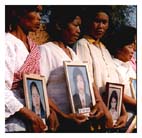 The grenade attack mentioned at the top was on March 30, 1997, almost fourteen months ago. If you were on my mailing list at the time, you might remember a message I wrote then, called Easter Sunday. At least sixteen people were killed right in front of the National Assembly as they protested against corruption in the judiciary. A bodyguard who jumped to cover Rainsy was killed, but Rainsy himself escaped serious injury.
The grenade attack mentioned at the top was on March 30, 1997, almost fourteen months ago. If you were on my mailing list at the time, you might remember a message I wrote then, called Easter Sunday. At least sixteen people were killed right in front of the National Assembly as they protested against corruption in the judiciary. A bodyguard who jumped to cover Rainsy was killed, but Rainsy himself escaped serious injury.
The grenades appear to have been the opening of Hun Sen's campaign to stay on as prime minister. Although there's no rock-solid proof, there's plenty of evidence, both physical and circumstancial. And the complete failure of the government--which controls the police and judiciary--to investigate the attack is damning. I remember one comment Hun Sen made about it: Before the blood was even washed away he accused Rainsy of have the grenades thrown at himself in order to frame the CPP. A fairly risky strategy, I'd venture to say.
|
Notice to American citizens in Cambodia
July 17, 1998
"Due to a climate of rising political tension and the recent hand grenade incidents in Phnom Penh, the U.S. Embassy advises all Americans in Cambodia to exercise increased caution in and around Phnom Penh.
"The Embassy reiterates its advice that American citizens should avoid political gatherings or demonstrations, avoid the vicinity of political party and military buildings or compounds, and exercise caution in crowds of any sort."
|
Everybody coming on this boat trip met this morning in front of Rainsy's office in Phnom Penh. A few journalists, a few office volunteers, a couple of dozen party supporters, and me. Rainsy was running late--I would find out that was the standard---and we were grouped around several cars and vans, waiting to find out exactly where the boat would be and how to get there. A boom split the air and we flinched. Some of the party supporters ducked for a moment. It was just a car backfiring, or maybe a truck. Nervous laughs all around; we were all thinking the same thing.
The boat was still bouncing across the waves when a flash lit up the sky ahead, and a starburst spread across the blackness. Then another--it was fireworks, a show seemingly just for us. Under them was an escarpment with a pagoda perched on top. We could only see the strings of lights running up the long stairway from the riverbank to the summit, but at the top was a life-size concrete elephant, quite realistic except for being bright blue.
We couldn't see this elephant from the little boat, even with all the fireworks going off, but I knew it was there because by pure chance, three weeks earlier, I and another friend, Chris Fontaine, were riding our rented motorcycles up that side of the river, about five hours into a marathon trip from Phnom Penh to Kratie. There we were, picking our way along the bumpy dirt track when we came across an old, well, geezer standing at a tight bend. He had a can in his hand a few soiled old banknotes. We recognized it immediately as the usual pagoda toll, paid in the the equivalent of about fifteen cents (bringing a smile to the old fellow's face) and turned off to see the pagoda.
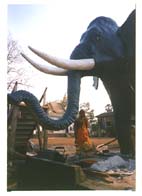 Just as we reached the top of the hill and rode into the grounds, a group of brightly robed monks gave a tug to some ropes and pulled the tarp off of the said elephant. It was apparently the inauguration of this beast, which overlooked the Mekong majestically, and we were just in time. Sadly, it was getting dark and we didn't really know what to say, except to compliment the creature lavishly, admire the view, and press on.
Just as we reached the top of the hill and rode into the grounds, a group of brightly robed monks gave a tug to some ropes and pulled the tarp off of the said elephant. It was apparently the inauguration of this beast, which overlooked the Mekong majestically, and we were just in time. Sadly, it was getting dark and we didn't really know what to say, except to compliment the creature lavishly, admire the view, and press on.
So, back in the boat, looking up at this pagoda, or really at the place where the pagoda had to be, judging from the lights, I screamed to Eric, "There's a huge blue elephant up there." I'm not sure if he heard me, but in retrospect I realize it's just as well if he didn't.
My satisfaction at having recognized where we were in such an obscure location was only slightly more than counterbalanced by my disappoint at our unimpressive progress. We had not even reached Stung Trang, a small town an hour's drive north of Kompong Cham, and a locality chiefly notable for the fact that all the way back in October of 1995, when I had only been in Cambodia for three months, the bulk of the Cambodia Daily staff took the morning off to drive (well, I rode my motorcycle actually) up to Kompong Cham, chasing a solar eclipse. Kompong Cham was just short of the path of the eclipse, which more famously passed first over the Angkor temples in the northwest. But the temples were too far away from Phnom Penh for people who put out a daily paper to get to, so we took went northeast up the Mekong.
In Kompong Cham we rented a speedboat and, in conditions as beautiful as the later ones were ugly, sped north for an hour to the bend where the path of the river met that of the eclipse. We got off the boat onto the small floating dock and quickly attracted a crowd of villagers, just in time for the moon's shadow to silence the birds and quiet the winds. Sunset appears simultaneously around the entire horizon as the sun disk was eaten away. We Daily staffers and the villagers passed around dark film glasses from Thailand to watch as day turned into night. Where the sun shone through trees it projected a movie of the eclipse multiplied a million times on the ground.
Up in the town, we drank some celebratory Angkor beers as curious kids gawked at us with such intensity that they forgot themselves and grabbed their crotches. We asked a couple of townsfolk what they thought had just happened. There were two main theories. One was that King Sihanouk had recently returned from China, where he'd had a successful cataract removal. Hence the temporary disappearance of the sun, and then the return of the light, see? Theory Two was a little more sinister: it must be a scientific experiment that the Americans are doing. Hmm, we said to each other, maybe it's time to go. Really, there wasn't any hostility. I for one felt a tiny pang of guilt for our earlier plan to threaten to take the sun away for good unless the villagers paid up. Then we'd take our four bucks and...well, I did feel a pang of guilt.
Sorry for the digression, but I've been meaning to write that story down for a couple of years now, and it's finally done. If you like, we'll say that I was remembering the eclipse as our little boat bounced along, veering east toward Chhlong. My back was aching from being hunched over the backpack. The roar of the motor was starting to have a drug-like effect on my brain. The lightning threw the silhouetted trees along the bank into sharp relief, like a slide show getting increasingly abstract.
Behind the row of trees on the right was a small road that followed the east bank of the river. Chris and I had left the pagoda of the blue elephant and driven our motorcycles across a rickety pier onto a small ferry, and crossed over to this road. The sun was setting. Sometime in the process of riding out of the boat and up the steep, crumbling bank, my rear tire blew out. We found the one tire repair shop in the first village, but by the time it was fixed the muezzin was making the sunset call. We rode along that road to Chhlong crazy, bouncing in the dark and dust...but I'll have to add that story in later.
Suffice it to say for now that there aren't a lot of reasons to go to Chhlong, but so far it seems that I can't get there without traveling at night and in danger. The rain finally thinned out. After 3 hours in the little speedboat we pulled over to the right bank. This was the place, the family house of one of Rainsy's supporters. The only problem was that the only boat there was ours.
Hushed discussions among the Cambodians followed. "Oh my God, we've lost the candidate," said Eric. I imagined the other boat overturned, caught in branches at the edge of the river somewhere. Rainsy and Saumura and the people with them floating...no, it wasn't worth thinking about. Maybe they turned around and went back when the rain started, and we just didn't see them. There was nothing on the other end of the radio.
We climbed the bank to see a graceful wooden house overlooking a spacious yard with a score of tables set out with dishes, bowls glasses. It was supposed to be a welcoming banquet, but we were three hours late and Rainsy was missing. We went to sleep worried on the wooden floor. While we slept, the big boat arrived, with Rainsy, Saumura and the rest on board. They had turned back a few minutes after the rain started, and chugged upriver all night.
Sometimes there's a break from politics. For a couple of weeks it was "Central Park West", Woody Allen's one-act play about five lost souls cheating on each other and picking each other apart. My housemate Sarah, four others and I are rehearsing it for a two-show stand upstairs at the Globe restaurant. It's going to be a play-reading, partially staged, but we get to look at the scripts. We rehearse in the afternoon in the restaurant, shouting out bitter, sarcastic, wounded New York lines while distant fishermen are framed in the tall, open window, poling their longboats along the opposite shore of the Tonle Sap.
A month earlier, when I was still unemployed and aimless, I took a 6:30 am ride across the Japan-Cambodia Friendship Bridge to Chroy Changvar, the pensinsula that separates the merging Mekong and Tonle Sap and faces Phnom Penh. After wobbling along until the riverine village lanes gave out. But I kept to the riverside, eventually balancing my rickety old Honda on the raised footpaths between silt-fed vegetable patches. I stopped when I felt as if setting my bike on its stand wasn't likely to get in anyone's way this day, or maybe this week, and took a seat on the riverbank of sunbaked mud.
So I am back there. I'll tell you what I'm looking at. It's the riverfront of Phnom Penh, the thriving metropolis that is the capital of Cambodia, a small country in which I find myself unexpectedly, even after three years. On the left, the southernmost extent of my view, is the Naga, a five-story floating house of sin--a Malaysian investment vehicle known as the floating casino, where, until just two hours ago, Joe Cochrane and I set a Ben Franklin each against the voracious house and its unfavorable blackjack odds and staggered out, three hours and numerous free beers later with noticeable financial gains.( Oh Naga, I have waited two long years to take my sweet revenge on you.)
The engineless gambling ship gleams, moored on the riverside next to some mud flats where squatters used to live (before they were rousted in the name of private property and civic beautification). Just north, or moving to my right, above a barren concrete embankment, stands the Cambodiana Hotel, which stood incomplete and abused throughout the Vietnamese regime of the 1980s and was reborn in time to collect the plenitude of United Nations largesse in the early 90s.
The morning's fishing boats, long, narrow, hand-planed barques pushed by long-tail motors or waggling wooden oars, work the current in front of my riverbank, south on the Tonle Sap to Chaktomuk, where the Sap draws the excess waters from the swollen Mekong during the wet season, and pours them back during the dry. On the flat top of the alluvium behind me a family sets to work on what looks like a field of potatos springing from the loam. If the sight of me, sitting on their riverbank and tapping on a laptop computer surprises them they don't betray it. There is no doubt I am the only one out here this morning with a computer, a camera and a cellphone--and no hoe. It's 7:30 and the sun is starting to hint at the heat of the day.
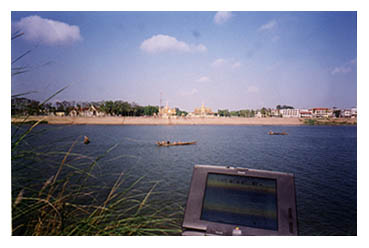 Across the river from me, and from the colony of ants which has set its collective intelligence to the doubtlessly crucial evolutionary role of climbing up my shorts, are the golden gables of the Royal Palace, where Norodom Sihanouk was raised, then later imprisoned by the Khmer Rouge. The grand entrance, a pavilion that normally features a huge portrait of the King, the Queen, or one of the their presumably noble antecedents stands facing me square on. My patch of silt is ennobled by this favorable exposure, and I can feel it! There is no portrait hanging there at the moment, although the King has recently returned to Cambodia. He stays in Siem Reap near the Angkorean temples, not in Phnom Penh. It can only be a way to distance himself from the political leadership of Hun Sen and the Cambodian Peoples Party, who stamped out any reasonable notion of sharing power last July.
Across the river from me, and from the colony of ants which has set its collective intelligence to the doubtlessly crucial evolutionary role of climbing up my shorts, are the golden gables of the Royal Palace, where Norodom Sihanouk was raised, then later imprisoned by the Khmer Rouge. The grand entrance, a pavilion that normally features a huge portrait of the King, the Queen, or one of the their presumably noble antecedents stands facing me square on. My patch of silt is ennobled by this favorable exposure, and I can feel it! There is no portrait hanging there at the moment, although the King has recently returned to Cambodia. He stays in Siem Reap near the Angkorean temples, not in Phnom Penh. It can only be a way to distance himself from the political leadership of Hun Sen and the Cambodian Peoples Party, who stamped out any reasonable notion of sharing power last July.
The riverbank on this side is for farming. On the other side, the city side, it seems to be for dumping untreated sewage and burning garbage. Thanks to plenty of river silt and to the effluent of the capital's citizenry, that side is rich with seasonal farmland. Above the small but fertile plots, each one staked out by a seasonal farmer, stands a row of riverfront businesses. First to the right of the palace is the Globe, where the playreading will be. It's operated by Duncan,the saxophonist for the Psychedelic Furs and the author of the song "Pretty in Pink". That will mean nothing to anyone who did not cut their musical teeth in the early 80s. Explanations for this odd circumstance are anyone's guess.
After a vacant garage is a restaurant that was until two months ago Le Rotonde, notable for its equally illegal and obvious casino, and as the site of an impressive involuntary exhalation of comestibles by Mr. Kevin Brown, who is even now wincing as he reads this. The European owners of La Rotonde were rounded up only two months ago by Interpol, in connection with a series of bank robberies in Belgium and presumably provided seed money for the restaurant.
A few doors north of that, overlooking a flatbed wooden river schooner chugging its way around the peninsula on which I sit (and whose ant colonies are becoming increasingly sophisticated in their explorations) is the now legendary FCCC--the Foreign Correspondents Club.
But rather than sully your screens with tiresome tales of expats, I'll describe the carved longboat which has just coasted alongside my piece of riverbank. In the rear stands a sturdy-looking woman guiding the vessel with a wooden oar fastened aft and starboard. At the bow stands her man in a bright yellow jersey. With a sidearm swing and a grunt he looses the net. It spreads like the cowl of an airborne jellyfish across the water before the weights along its edges pull it down, then to be gathered together, freeing the waters of the Sap but imprisoning some of its denizens. The boat drifts north, out of view. Now the ants are crawling all over me. It's getting hot too--the early morning couldn't last long in a place where the the daily high approaches 40C in this hot season. I'm eying the silty waters. The effluent is, after all, on the other side, the city side, right?
The water is getting just a little whipped up by a southerly wind. Heavy-laden riverboats plow their noses deep into the current, upper and lower decks groaning beneath sacks of something--rice?--and plastic jugs of something else. Gas, or just empty ballast. They kick up a light wake ten feet beneath where I sit on the bank.
From here Phnom Penh doesn't look a lot bigger than its sister cities along the river, Kompong Cham, Kratie, and so on. Not like a capital, not like a city of a million looking for a mouthful of steamed rice and a fair shot at democracy. If this were Ho Chi Minh City, a couple hundred kilometers down the delta, I could look straight up and see giant neon billboards for Seiko and Coca-Cola, flashing their urgent messages to the residents of the people's paradise. Here there is nothing but the sun and the first tentative clouds of the coming rains and a field full of potato plants, or whatever they are, sighing as the sun-baked soil is loosened around their straining stems.
Five minutes later the mud has pulled my shoes off and I'm wading into the glistening brown waters. I dive and plow my hands into the velvety bottom, pulling up hands full of rich river silt. I clench my fists around the sinuous smoothness and squeeze, open my painted hands in the sun and watch it burst into stormy puckered rivulets that run down my arms, meet the border of air and water and blow away.
Anyway I came home from a playreading rehearsal one day, still feverish from some organism that filled last night with hallucinations, and desperate for a nap. I found our palace full of Cambodians, and Beth, moving things around bailing like crazy. Both my bedroom and Sarah's were transformed into wading pools. Water poured through the ceiling fans and dripped steadily from dozens of bubbles on the ceilings. All my things--barely unpacked as I had moved in only recently--were dumped out into the living room. We knew they'd be working on the water pipes under the house--so why was all the water upstairs? This has to be a legendary screw-up! How the hell did they flood the upstairs by fixing the pipes downstairs? Our landlord, a CPP colonel, stood barefoot surveying the mess. We finally communicated successfully. A big piece of the roof collapsed under the first really violent rainstorm of the year, and no, nobody is going to go up there with a tarp or anything, not until tomorrow. I'm exhausted already and now I have to bail my room with a dustpan. After half an hour I give up and collapse on the bare slats of my bed frame out in the living room.
Five hours on, the rain stopped, started and stopped again, and the buckets kept filling. Now and then there's a wet tearing and a splat as a piece of ceiling peels away, dumps a load of water, and falls to the floor.
A few nights ago I was riding my motorbike home at midnight and I stopped at the Japanese ambassador's house to watch some of Denmark v. Saudi Arabia. I didn't see the ambassador though--that's because I was watching it with the guards out on the sidewalk. They ran a cord out of the house and set up a little color TV facing the street. There was a little table with a couple of half-eaten bowls of noodles. It's good to develop a relationship with the guys who carry AK-47s on your block. They offered me a chair, which I accepted, and we sprawled out as best we could on the edge of the street, a few people, a few motorbikes lit up by French sunshine coming through the television. Behind us stood the buildings of the Ministry of Interior, nerve center of a vast and unruly patchwork of security forces. Above us hung the Cambodian stars.
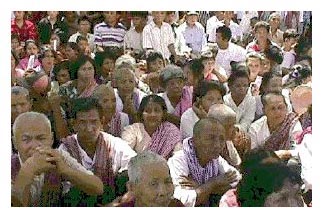 |
Democracy:Apparently, they don't deserve the real thing.
|
July 10, 1998: The polling date is only two weeks away. People in this politics-crazed town are starting to really wonder what happens if the CPP sees no way out. They have to be realizing that they will not win a majority, even after all the abuses they have committed, all the ways they have hijacked the elections. So they look to the polling date, and count on massive fraud, or at least enough fraud to get them a majority. But that door is closing--the election commission is under the eyes of the international community and a squad of seasoned election advisers. So far they've let the ruling party get away with everything including murder, but they want a clean election day. Ballots printed on special paper in New Zealand, silver nitrate ink for dipping fingers, triple-locked ballot boxes from Japan. We want the polls to be fair too, but that would slam another door in the face of the CPP.
Behind the twenty-foot fences of the sprawling CPP compound, tension must be high. The hardest of the hard-liners must be pushing for drastic action to prevent an embarrassing result. Where is the next door? In a more stable country, under the rule of law, we would feel nothing but positive about our increasing popularity. Here it means we are dealing with a cornered animal.
I dropped by the SRP Cabinet office tonight to make sure Rainsy had called up Jeff at the Daily about the Sin Sen story. Sin Sen, long a major figure in the CPP, threw his support to Rainsy yesterday. A shift in the wind that that strengthens us while it makes the other side less happy, and more dangerous. Sin Sen is making himself an example for others who might want to shift allegiance. We just hope the other side doesn't make an example of him. I should add that Sin Sen happens to live next door to our office.
As I came out, passing through a crowd of our unarmed security team, a headlight beamed down the street and a low-slung motorcycle roared toward us. The kind of motorcycle favored by the kind of tough guys who work for the military bodyguards, the Ministry of the Interior or some other enforcer group. I tensed as it came, and looked away, at the faces of our guards frozen in the glare. I forced myself to relax just as it passed. Then I got on my own motorcycle and buzzed off into the darkness.
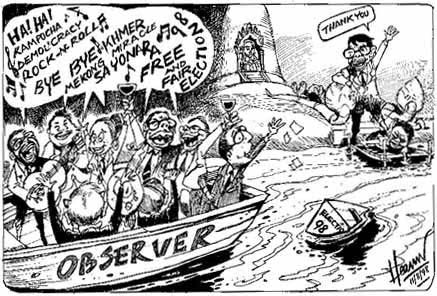
Cartoon by Bun Heang Ung
The day after the voting was July 27. The early results were excellent. But the tide turned as the counting went into the afternoon. Spirits in the Rainsy office drifted into depression. Something was wrong. The numbers weren't adding up. It was difficult to get the figures. Late in the day, after a long break in the counting, the CPPwas pulling ahead. But how? Then two days of depression. In the US you would know that now you can relax. For the first time, Rainsy seemed at a loss, without a new direction yet. Nothing we didn't expect, right? Stories filtered in--beatings of observers, cheating in the counting process. The Joint International Observer Group statement rocketed out on late on the 27th. Broadly representative of the will of the people, as if they could know. It's ostensibly a preliminary statement, but of course it's the only one that will ever count.
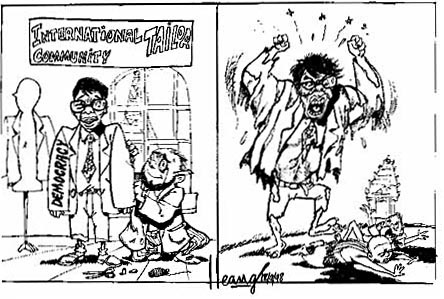
Cartoon by Bun Heang Ung, after my concept.
Three months after polling day. I usually get up after staring around my room for about ten minutes, considering the pros and cons. Eventually it becomes more likely than not that there is coffee ready. I prop the door open with a disused electrical adapter and pad across the red and white tiles to the cybercafe. Mao has put out coffee and two cups, one with sugar for me and one without for Sarah. Sarah will soon race out of her room, pour a cup of coffee and drink half of it, and race off to work at the hotel one hour late. I will pour her leftover coffee into mine and check the Daily over. Obviously I have already hit control-m to download my e-mail. I surf the Daily for local articles that concern Rainsy, the opposition in general, the formation of a government, or issues that Rainsy can comment on. Anything big I will have to write a statement about, or a letter to the editor, or pick a journalist to market a story idea to. Same with the e-mail; I'm on CamNews so I get most of the wire service stories on Cambodia.
October 1998:
Things are going rather poorly as far as democracy is concerned. Hun Sen made the world afraid to get rid of him, so they let him stay by sponsoring and predictably approving his rigged election. It's a secret sellout. So I'm trying to keep working hard despite the demoralization that comes with consistent defeats. Now Rainsy is off visiting DC, NY and Paris trying to get our side of the story out, while the opposition members here head to Thailand so they can't be threatened into selling out.
Strange kind of fame this; my words go all over the place but usually without a name, or with Rainsy's name attached! Probably good for me, ego-wise. Rainsy went off to DC and NY this morning. I'm in Bangkok with half of the SRP members of parliament. We sit around in a big house here listening to sixties songs and typing in list of party activists to give to human rights groups. Maybe later today I'll try to go back to Cambodia--I hope they let me in because all my stuff is there!
You might have seen Hun Sen's threats to close the Daily and the Phnom Penh Post; there was a small article in the Chicago Tribune on Oct 5 or 6. It's all part of a gradual crackdown on rights in general, as Hun Sen has learned that the UN and the foreign governments will let him get away with anything as long as there is a democratic window-dressing.
I'm just hoping that the situation will somehow stabilize, and I can reduce my role over the next couple of months. I don't know how it turn out, but the signs are bad. I think Hun Sen is aiming to replicate the level of democracy in, say, Suharto's Indonesia.
I'm depressed, demoralized, dejected. There are days when the rain comes down so hard, and I wonder what it is to live in a world so full of ignorance and the laziness that lets evil thrive. Is it better to flee into a world of philosophy and study the "nature of evil" or other abstracts, or to give up and avoid seeing the worse part of its effects, to flee and find a mental place where people enjoy the blessings of ignorance, if there is such a place?
If I could describe the last few months I would say that they have been full of stories, many of them funny and most of them sad. I have seen from closer than ever before the longing for democracy crushed by the greed of the powerful and the indifference of the countries that themselves already enjoy a kind of democracy. I have seen those who fight for freedom wound themselves and their struggle with terrible errors born of their own flaws. I am so full of stories that they battle each other to get out and fall over themselves untold. I have had so many thoughts they tangle in thickets.
It's not possible, at least for me, to go on fighting for what I think is the truth unless there's a chance of success. That's true for most people, and I try to remember it when organizing. There has to a chance, some light at the end of the tunnel or at least a trick of the imagination. For a while it did seem as if the Cambodian elections could change something, something that was supposed to have changed back in 1993 when UN organized elections, but didn't.
The 1998 elections were supposed to prove that the world did give Cambodians the gift of democracy. Everything was set up to show this, the world came with money and advisers to make sure the show went on, and it did. The show went on.
And now it seems the moment has come when we realize it was a trick, though not entirely one of the imagination. There are villains in this story, absolutely, but they are not the ones I expected.
For the past three months I have churned out hundreds of statements, spoken to legions of correspondents on and off the record, studied election law, interviewed the victims of abuse at the hands of the police and the army, advised and cajoled politicians perhaps far beyond what is my right coming from outside Cambodia. But my job was to communicate our ideas and our picture of the Cambodian situation, and how could I do it if I didn't understand as best I could what it was, and how could I not try to make our behavior the most effective possible in order to help bring Cambodia a little closer to democracy?
I know very well that it is going to sound as if I am taking too much responsibility on myself. Maybe I'm just building myself up, wanting to be influential, tending to see myself as more central than I ever was. If so, I have no apologies for it. Anyone asks me for advice, I try to give what's in my competence, and those who don't want to hear about it can hit delete.
I have a microscopic knowledge of the 1998 Cambodian elections now. But I'm going to make a great effort to step back and summarize it for you, and if I'm at all successful in that then you will understand why today I feel so beaten. And then if I have anything left I will try very hard to find the lessons in it, and to search for the gains, because there must have been some, right?
Back to Cambodia page
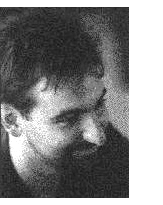 go to top of this page
go to top of this page
go to new site entrance
e-mail me your comments
 There was no dancing in the streets of Phnom Penh when the news of Pol Pot's death drifted down from the mountains, borne on radio waves and telephone wires. At first there was skepticism. He had been reported dead a couple of years earlier, only to reappear as the hidden leader of the Khmer Rouge and later as their captive. But this time it was true: One of the great monsters of history died last Wednesday, on the evening of the second day of the Khmer new year celebration.
There was no dancing in the streets of Phnom Penh when the news of Pol Pot's death drifted down from the mountains, borne on radio waves and telephone wires. At first there was skepticism. He had been reported dead a couple of years earlier, only to reappear as the hidden leader of the Khmer Rouge and later as their captive. But this time it was true: One of the great monsters of history died last Wednesday, on the evening of the second day of the Khmer new year celebration. 
 Note: What you're reading here is mine alone. If you need to reach the Sam Rainsy Party, e-mail the Cabinet at
Note: What you're reading here is mine alone. If you need to reach the Sam Rainsy Party, e-mail the Cabinet at 

 Across the river from me, and from the colony of ants which has set its collective intelligence to the doubtlessly crucial evolutionary role of climbing up my shorts, are the golden gables of the Royal Palace, where Norodom Sihanouk was raised, then later imprisoned by the Khmer Rouge. The grand entrance, a pavilion that normally features a huge portrait of the King, the Queen, or one of the their presumably noble antecedents stands facing me square on. My patch of silt is ennobled by this favorable exposure, and I can feel it! There is no portrait hanging there at the moment, although the King has recently returned to Cambodia. He stays in Siem Reap near the Angkorean temples, not in Phnom Penh. It can only be a way to distance himself from the political leadership of Hun Sen and the Cambodian Peoples Party, who stamped out any reasonable notion of sharing power last July.
Across the river from me, and from the colony of ants which has set its collective intelligence to the doubtlessly crucial evolutionary role of climbing up my shorts, are the golden gables of the Royal Palace, where Norodom Sihanouk was raised, then later imprisoned by the Khmer Rouge. The grand entrance, a pavilion that normally features a huge portrait of the King, the Queen, or one of the their presumably noble antecedents stands facing me square on. My patch of silt is ennobled by this favorable exposure, and I can feel it! There is no portrait hanging there at the moment, although the King has recently returned to Cambodia. He stays in Siem Reap near the Angkorean temples, not in Phnom Penh. It can only be a way to distance himself from the political leadership of Hun Sen and the Cambodian Peoples Party, who stamped out any reasonable notion of sharing power last July.


 go to top of this page
go to top of this page